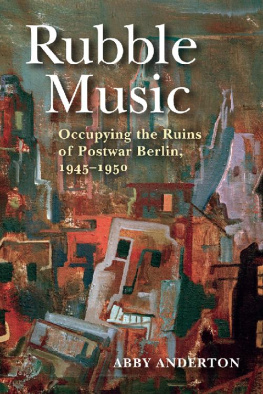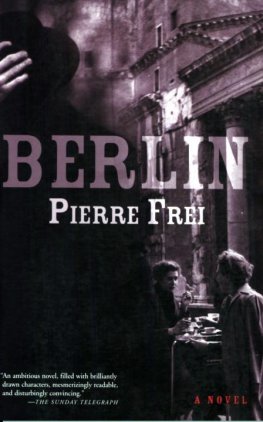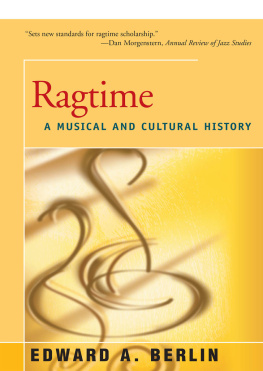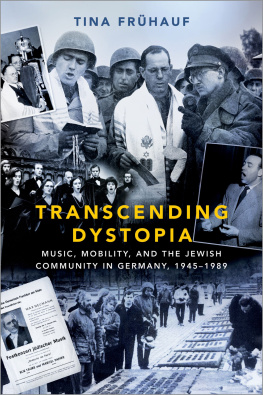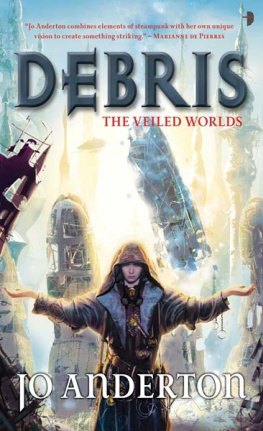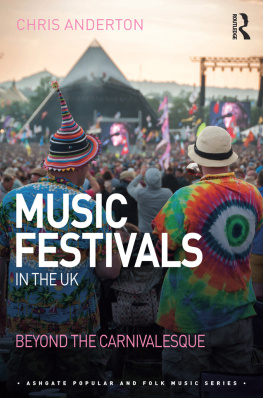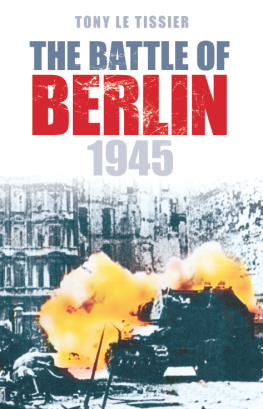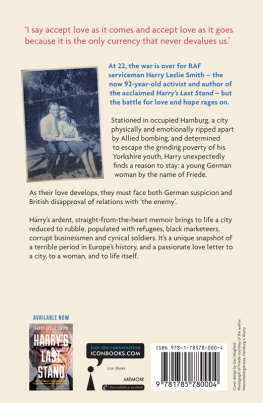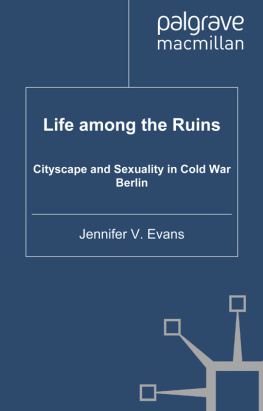RUBBLE MUSIC
This book is a publication of
Indiana University Press
Office of Scholarly Publishing
Herman B Wells Library 350
1320 East 10th Street
Bloomington, Indiana 47405 USA
iupress.indiana.edu
2019 by Abby Anderton
All rights reserved
No part of this book may be reproduced or utilized in any form or by any means, electronic or mechanical, including photocopying and recording, or by any information storage and retrieval system, without permission in writing from the publisher. The paper used in this publication meets the minimum requirements of the American National Standard for Information Sciences Permanence of Paper for Printed Library Materials, ANSI Z39.48-1992.
Manufactured in the United States of America
Library of Congress Cataloging-in-Publication Data
Names: Anderton, Abby, author.
Title: Rubble music : occupying the ruins of postwar Berlin, 1945-1950 / Abby Anderton.
Description: Bloomington : Indiana University Press, 2019. | Includes bibliographical references and index.
Identifiers: LCCN 2018049714 (print) | LCCN 2018051366 (ebook) | ISBN 9780253042439 (e-book) | ISBN 9780253042415 (cl : alk. paper) | ISBN 9780253042422 (pb : alk. paper)
Subjects: LCSH: MusicGermanyBerlin20th centuryHistory and criticism.
Classification: LCC ML275.8.B47 (ebook) | LCC ML275.8.B47 A54 2019 (print) | DDC 780.943/15509044dc23
LC record available at https://lccn.loc.gov/2018049714
1 2 3 4 5 24 23 22 21 20 19
For Dennis.
CONTENTS
T HIS BOOK PROJECT BEGAN AS THE FLICKERING OF an idea I had while spending the summer in Berlin. As a first-year graduate student at the University of Michigan, I visited the capital ostensibly for a course at the Goethe Institute but soon decided to develop my research project around the citys sounds, its geographies, its complicated history. Rubble Music is the result of the ensuing time I spent combing through the citys archives, returning as often as I could to study unpublished scores, diaries, and correspondence written by Berliners who lived through the liminal space between war and peace. Their stained pages raised new questions for me about the resonances of 1945, and I knew I had to write a book about their experiences.
There are many people to whom I am indebted for their time and generosity as I completed this project. Jane Fulcher, my doctoral adviser, supervised this work in its early stages, providing an inspiring example of how to combine rigorous research with a compelling storyline. Similarly, Steven Whiting, Charles Garrett, Silke Maria-Weineck, and Annie Randall provided wonderful advice and support throughout the many phases of writing.
I am thankful for the help and comments of my editor, Janice Frisch, who expertly guided this manuscript through its various iterations. Likewise, the comments of the anonymous readers were absolutely invaluable, and I am very appreciative of their insights and observations. My wonderful colleagues at Baruch College, City University of New York, have provided unwavering encouragement, most especially Anne Swartz, Leonard Sussman, Debra Caplan, John Maciuika, Liz Wollman, Andrew Tomasello, Phil Lambert, Andrew Sloin, Martina Nguyen, and Elizabeth Heath. I am grateful for the scholars who took time to discuss this manuscript with menamely, Pamela Potter, Annegret Fauser, Amy Lynn Wlodarski, Danielle Fosler-Lussier, Walter Frisch, Robert G. Moeller, Monica Black, Amy C. Beal, Mike Beckerman, Joy Calico, Allan Atlas, Tina Frhauf, Anne Shreffler, Anne Stone, and Stephen Brockmann. Their insights made a world of difference in the resulting book.
To my fellow postwar-minded academics, Martha Sprigge, Emily Richmond Pollock, Kira Thurman, and Kathryn Sederberg, my thanks for sharing ideas, encouragement, and delicious cake while discussing our respective projects. Friends in Michigan, New York, and Berlin were always willing to talk through ideasnamely, Alison DeSimone, Meghan Fox, George Fragopoulos, Katie LaPorta, Nick and Anja Westray, Kim Philip, Lucy Dauner, Olivia de Paeztron, Liam Billingham, Emily Weiss, Brandon Woolf, and Tina Petereit. My thanks to Matthias Weiter and Manuela Malaszkiewicz-Weiter, our Berlin family, for generously sharing their home with us during summer research trips.
I would like to express my sincere appreciation to the funding and institutional structures that supported the research for Rubble Musicnamely, the Fulbright Commission, the German Academic Exchange Service (DAAD), the Holocaust Educational Foundation, the Professional Staff Congress and the City University of New York, the Eugene Lang Foundation, and the AMS 75 PAYS Endowment of the American Musicological Society, funded in part by the National Endowment for the Humanities and the Andrew W. Mellon Foundation. Archives in Germany provided the bulk of the materials for this project, and I would especially like to thank Dr. Werner Grnzweig and Peter Deeg of the Akademie der Knste, Katja Vobiller of the Berlin Philharmonic Archive, Jean Christophe Gero of the Staatsbibliothek, Monika Bartzsch of the Landesarchiv, and Andreas Meurer of Ries and Erler Verlag.
I am endlessly appreciative of my parents, Dave and Mary Joyce, who provided encouragement during my early days of graduate school through Rubble Musics completion. I would also like to thank my brother, my in-laws, and my sisters-in-law for their support. Finally, I would like to dedicate this book to my husband, Dennis, whom I met on a rainy summer evening in Grlitzer Park. He has been my constant supporter, willing to discuss everything from translation questions to methodological approaches. Our son, Anselm, was born shortly before I sent off the final version of this manuscript. The care and patience of my family allowed me the time I needed to complete this project, and I am looking forward to seeing what our next adventure together will be.
RUBBLE MUSIC
A S SOVIET FORCES SURROUNDED BERLIN, PREPARING FOR THEIR final assault on the capital in April 1945, many of the citys musicians continued their creative endeavors. Composer Paul Hffer completed a first draft of his Toccata for solo piano, noting beneath the final fermata, born under pain, April 15, 1945. As sonic, archival, and historical evidence indicates, despite the regimes collapse, the third week of April 1945 was another workweek for many of Berlins musicians. Musical culture did not begin anew after the collapse of the Third Reich; it simply continued, as artists worked with the materials and personnel at handhowever compromised, however rubbled.
Five days after the unconditional surrender of Nazi Germany, on May 13, conductor Hans von Benda decided it was time for a concert. Benda gathered together the remaining members of the Berlin Chamber Orchestra, the ensemble he founded in 1939, along with musicians from the citys Philharmonic, Staatsoper, and Stdtische Oper orchestrasabout thirty players in all. With the permission of the citys newly installed Russian occupiers, the musicians decided to perform in the partially destroyed Schneberg town hall. In lieu of posters, Bendas instrumentalists advertised the performance by writing in chalk on the ruins of their apartment buildings. As the conductor had no trouble noting for posterity, the Schneberg auditorium was transformed literally from a pile of debris into a room worthy of the occasion, only twenty-four hours before the concert. But for the moment, a fresh coat of paint would have to suffice.
Accounts like Bendas emphasize resilience despite the debris and ashes left behind by World War II. Yet destruction left its mark on the citys depleted ensembles, shattered institutions, and occupied radio waves, as rubble became the defining feature of postwar musical culture. Whether figurative or material, rubble was the common postwar fragmentation to be worked through, representing, in turn, the intellectual quandary of the denazification process, a rebuilding material, an audible sonic element, a performance practice, and a compositional aesthetic. The scale of this reconstructive undertaking can be seen in the now iconic visual imagery of postwar Germany, whether in film or photography, where towering urban ruins reveal the arresting and unintentionally picturesque remnants of aerial warfare. But what about the sound of such destruction and its effects on musical culture, from compromised musicians and bombed-out venues to concerts and compositions for which urban ruin was the catalyst?
Next page
